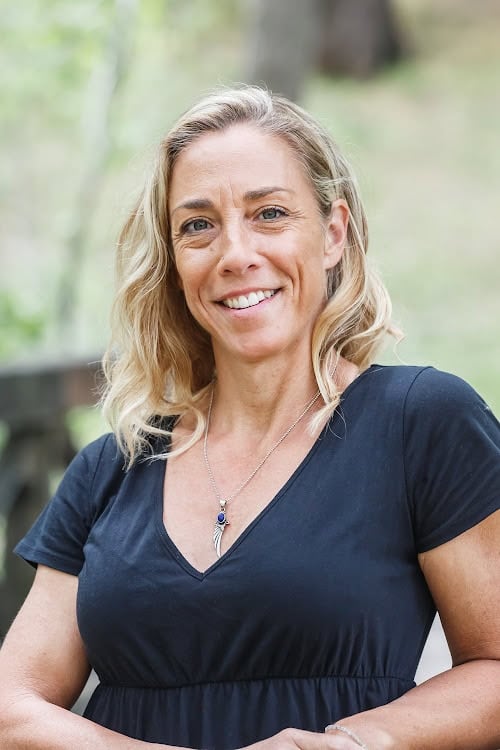Table of Contents
Are you looking for a flexible way to work from home and earn a full-time income? Becoming a virtual assistant might be exactly what you need. Today, I’m excited to share an interview with Laura Nicholls from Fully Booked VA. Laura started her work-from-home career in 2017 after leaving her day job and has since…
Are you looking for a flexible way to work from home and earn a full-time income? Becoming a virtual assistant might be exactly what you need.
Today, I’m excited to share an interview with Laura Nicholls from Fully Booked VA. Laura started her work-from-home career in 2017 after leaving her day job and has since built a thriving online business that allowed her to support her family, design her ideal schedule, and work with clients she loves.
In our interview, Laura shares how she got started, how she found her first clients, and the steps she recommends if you want to become a virtual assistant. She also talks about the skills you need, how much you can realistically earn, and how the Fully Booked Foundations course has helped others go from zero to fully booked in less than a year.
If you’ve been thinking about becoming a virtual assistant but aren’t sure where to start, this interview is a great guide that will help you to take your first step.
Also, Fully Booked has a really helpful virtual assistant guide that you can sign up for by clicking here. This guide gives you a list of over 275 services you can sell as a virtual assistant and also teaches you how to find your first clients.
How I Make Money as a Virtual Assistant
If you want to learn how to start a virtual assistant business and work from home, this interview is a great place to get started!
Recommended reading: How To Find Beginner Virtual Assistant Jobs

1. Tell me your story. Who are you, and what do you do?
I started my business eight years ago in 2017. Before that, I worked in mental health for 14 years – most of that time as a therapist – and I’ve always had the skill set of writing. Writing played a huge role in my work as a therapist and mental health worker, so it was a skill I had cultivated in my “9-5 career.” When I found myself needing to generate income and wanting to stay home with my then-infant daughter, I took inventory of what I could do from home.
I had just come out of a women’s shelter and was in crisis, rebuilding my life after losing my home and all my possessions. I had nowhere to go but up. I had tried network marketing in previous years, but I knew that wasn’t a viable model for me. I needed something legitimate that would allow me to support us full-time as quickly as possible.
I started as a freelance writer and quickly began working as a virtual assistant, focusing on content services. Working with a variety of businesses helped me learn how different businesses function and gave me insight into marketing, operations, and so much more. Offering more diverse services outside of content also allowed me to grow my income faster than writing alone.
Over the years, my work evolved. Now I specialize as a copywriter, content marketing strategist, and book coach. I’ve shaped my services to align with the kind of clients I want to work with and the rates I want to charge. I was able to support us financially from the start, and about three years in, I was earning enough to pay rent on a three-bedroom home and send my daughter to private school.
While I don’t share specific numbers, I’ve earned a full-time income for the last six years.
2. What exactly does a virtual assistant do?
A virtual assistant can do almost anything a business needs to operate.
It’s someone who provides services from a distance in exchange for payment. That can include administrative support, customer service, content writing, marketing help, tech support – really anything a business owner might want to outsource.
3. Why did you decide to become a virtual assistant? How did you get started?
I touched on this in my first answer, but I got started as a freelance writer. Then I received coaching that encouraged me to expand into virtual assistant services so I could work with clients in more ways. I always focused on content services, but I needed something legitimate, flexible, and fully on my terms.
As a single parent, I knew I wasn’t going to leave my daughter to return to the traditional workforce – and I didn’t want to. I needed a way to earn stable, consistent income that supported our life.
I started by taking inventory of what I could do and what I enjoyed. I reached out to people I knew in the writing and freelancing world, although not everyone was encouraging. Some family and friends discouraged me, but I went for it anyway.
Having spent time in network marketing and online marketing, I knew there was potential in working online – I just hadn’t found the right model. The aggressive sales tactics and constant marketing didn’t suit me and didn’t feel sustainable or trustworthy.
Then I found what was then called Horkey Handbook (later Fully Booked VA, now Fully Booked). I scraped together the money to take my first course and immediately started taking action, implementing everything I learned step-by-step.
4. How did you find your first client? Any tips on finding initial clients or what worked well for you?
My first clients came around the same time. One was someone from my existing network – someone I hadn’t spoken to in years. I wrote a blog post that referenced him, shared it with him, and we reconnected. He ended up hiring me, and we worked together for almost three years. We still occasionally work together now. That relationship brought in other referrals and helped me build confidence.
The second client came from the Fully Booked client leads. The leads program was new at the time, and I responded to one of the very first leads they posted. It was for a project I hadn’t done before, but I knew I had the skills to figure it out. I sent a video pitch and landed the job.
After the project ended, he continued to pay me for a few months, even though there wasn’t much left to do. I realized he valued me as a person – my support, belief in him, and encouragement – more than just the specific task I performed. We only communicated by phone and email, never in person or via video, but it was incredibly validating.
People often think they don’t have a network, but they do. You just have to reach out. My biggest tip is to lean into your existing network. People who know and care about you often want to support you – and you don’t need to be in crisis for that to be true. Most people in the Fully Booked community find their first clients this way.
Reaching out to that old contact was uncomfortable, but it laid the foundation of my business. That one action led to referrals, financial growth, and the confidence to keep going.
5. What do you enjoy most about being a virtual assistant?
Although I no longer call myself a virtual assistant, what I loved most was the people I worked with. I supported solopreneurs who had built their own businesses. It felt like an honor to step in and help bring their vision to life.
The work was energizing – but more than that, I loved the lifestyle it allowed me to create. When I realized it would just be me and my daughter after the crisis we went through, I committed to building the best life I could for us. That meant being present, working from home, and living on our terms. I’ve been able to do exactly that.
6. How much money can someone realistically earn as a virtual assistant?
I’ve seen virtual assistants earn into the six figures. It depends on how they apply themselves and what path they take. I recently interviewed someone who started just over a year ago. Within eight months, she was fully booked. Less than a year in, she started an agency and hired five people from our community.
Some people undervalue themselves in the beginning, but the truth is it’s possible to earn a full-time income as a virtual assistant. For some, it’s a long-term career. For others, it’s a stepping stone into something else. Being a VA gives you the opportunity to learn while you earn, which opens up many possibilities you might not have imagined when you first started.
7. What skills or qualifications are needed to succeed as a virtual assistant?
That’s one of my favorite questions.
Being a virtual assistant is about taking what you already know – skills from your previous jobs or life experience – and applying them to help business owners.
The most essential skills are perseverance, belief in yourself, and the willingness to take consistent action. You also need to communicate well, be professional and reliable, and have integrity.
This work is relational. People hire people more than they hire skill sets. I’ve been hired just because someone wanted to work with me. We didn’t even define the role upfront – we figured it out together. That happens more often than you’d think.
8. What kind of equipment does someone need to get started as a virtual assistant?
A computer and a reliable internet connection. That’s really all you need.
You can get started with free tools: Calendly for scheduling, PayPal or Wave for invoicing, and Google Docs for sharing files. As your business grows, you can invest in software, but the entry point is very accessible.
9. What is your typical work schedule? How many hours do you work each week, and how flexible is your schedule?
These days, I take my daughter to school in the morning, walk my dogs in the woods, and sit down to work around 9 or 9:30. I wrap up around 2 p.m. when it’s time to pick her up. During summer or before vacations, I work longer days to get ahead.
I earn a full-time income working 20 to 30 hours per week – usually closer to 20. My schedule is extremely flexible because I’ve designed it that way. I’ve never worked with clients who expected me to be available at set times outside of scheduled meetings.
At one point, I could only work at night when my daughter was asleep. I also lived on a 40-acre horse ranch, caring for 30 horses. I needed a business that fit my life, not the other way around. And that’s what I created.
10. Is there room for new virtual assistants in the industry?
Absolutely. More than ever.
The demand for freelance and remote services has only increased, especially since the pandemic showed us there are better ways to work. Businesses continue to outsource services, and virtual assistants are a big part of that shift. We see people come into Fully Booked all the time and find clients. That hasn’t changed in over a decade; it’s only increased.
11. Can you list the steps to get started as a virtual assistant?
- Decide and commit.
- Identify what you can offer – your skills, interests, and experiences.
- Start talking to people. Your network is more powerful than you think.
- Set up a basic way to invoice clients.
- Begin taking action – bit by bit.
If you want to build something long-term, I recommend learning how to run a sustainable business. Otherwise, you risk recreating the same burnout you had in a traditional job, just from home.
12. What are your best tips for someone who wants to become a virtual assistant?
Just start. That’s the biggest thing. Don’t spend years thinking about it – many people do. The demand isn’t going away.
Take consistent action. Don’t get stuck in research mode. Try something, see how it works, and adjust. Stay curious instead of judgmental. If something doesn’t work, do something different.
And surround yourself with support. Fully Booked was a huge resource for me – not just the courses, but the coaching and community. Sometimes we need someone else’s perspective to help us see the next step.
13. What can a person learn from your course? Can you tell us about some of the people who have successfully taken your course?
In Fully Booked Foundations, you’ll learn the core components of starting a successful service-based business as a virtual assistant. That includes setting up infrastructure (like contracts and invoicing), learning how to find and land clients, and developing the right mindset.
You’ll also learn best practices for working with clients: onboarding, handling feedback, navigating tricky situations, structuring meetings – things you might not know to think about yet. The course takes the guesswork out of those early steps.
One of our recent members joined to earn some side income and be more available to her kids. Within eight months, she was fully booked. Within a year, she’d started an agency and hired five other Fully Booked members. She’s not the only one – we’ve seen so many people come in just wanting something different from the 9-5 and end up building thriving businesses. Some build agencies. Others specialize like I did and grow into high-level, high-income work. There’s no one right path – just the one that works for you.
Are you interested in starting a virtual assistant business? What other questions do you have?
Recommended reading:



